Yunnan small Coffee, known as "fragrant Coffee", introduces the characteristics of Alpine Arabica Coffee producing areas in Yunnan, China
China's Hainan and Yunnan are places where coffee is grown, and Yunnan is the largest producer of coffee in China. Yunnan coffee is also known as Yunnan small-grain coffee, which is called "fragrant coffee". The annual output of coffee in Yunnan is about 26000 tons in recent years, accounting for 90% of the national output.
Coffee is a kind of beverage crop with high economic value, which is called the three largest beverages in the world together with cocoa and tea, and its output and consumption ranks first among the three beverages. Coffee is rich in protein, fat, sucrose, starch, glucose, caffeine and other substances, rich aroma and delicious taste. Coffee is a perennial evergreen shrub or small tree of the genus Coffea of Rubiaceae. There are many species, including small, medium and large seeds.
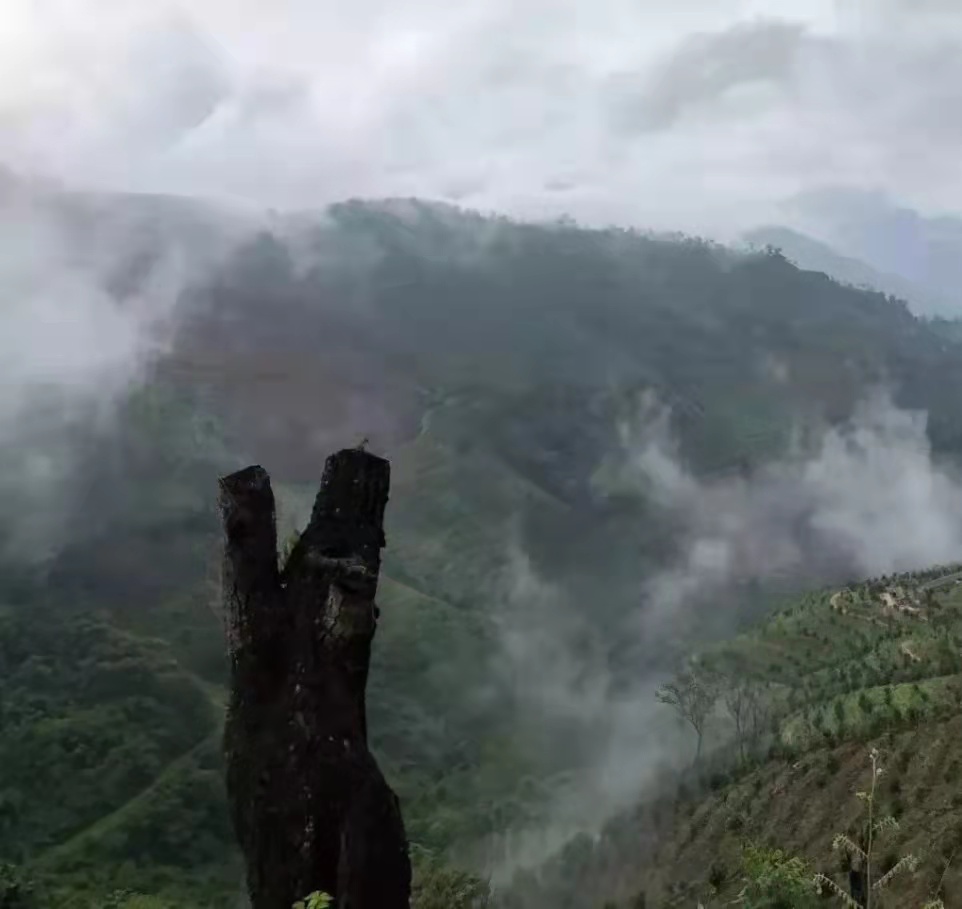
However, due to a variety of reasons, the development of Yunnan coffee industry is not fast. Yunnan coffee is mainly exported as raw materials, with an export volume of about 15000 tons in 2006. More than 60% of raw materials are acquired by Nestl é and Maxwell each year, and Starbucks and Amway have joined in recent years.
China has not only a long history of tea, but also a long history of coffee cultivation in Yunnan. As early as 1904, the missionary Tian Deneng came to Dali to preach and brought some coffee seedlings to be planted in Zhugula Village, Binchuan, which opened the history of coffee cultivation in Yunnan. However, due to a variety of reasons, the development of Yunnan coffee industry is not fast. With the promotion of high-quality coffee and the implementation of domestic products, Yunnan coffee has become a household name of coffee. Yunnan coffee can be seen in cafes now.
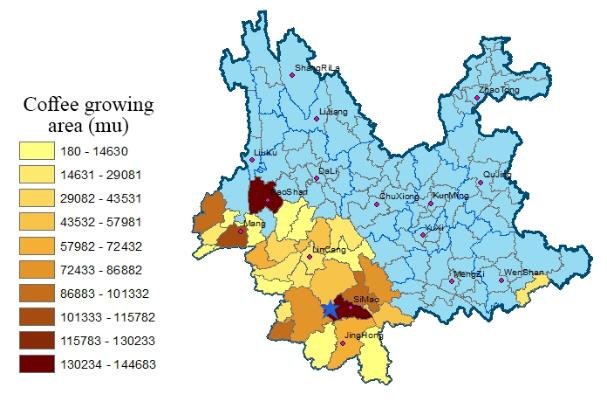
Although coffee is a crop, it has higher requirements on the growing environment. The natural conditions of Yunnan are very similar to those of Colombia, that is, low latitude, high altitude and large temperature difference between day and night. The small grain coffee produced is mellow by cup quality analysis, and its quality and taste is similar to that of Colombian coffee. The western and southern parts of Yunnan Province in China are located between 15 °N and the Tropic of Cancer. They are also areas rich in fine coffee in China. Most of the areas are 1000-2000 meters above sea level, and the topography is dominated by mountains and slopes. Moreover, there are great ups and downs, fertile soil, sufficient sunshine, rich rainfall and large temperature difference between day and night. These unique natural conditions in Yunnan Province form the particularity of Yunnan small grain coffee taste-strong but not bitter, fragrant but not strong. With a slightly fruity flavor, it has become an indispensable producing area for coffee glutton.
Main coffee producing areas in Yunnan
The main coffee growing areas in Yunnan, China are: Lincang, Baoshan, Dehong and Pu'er. Coffee beans produced in these areas have long gone abroad to major coffee consuming countries such as South Korea, Japan, the United States and Europe.
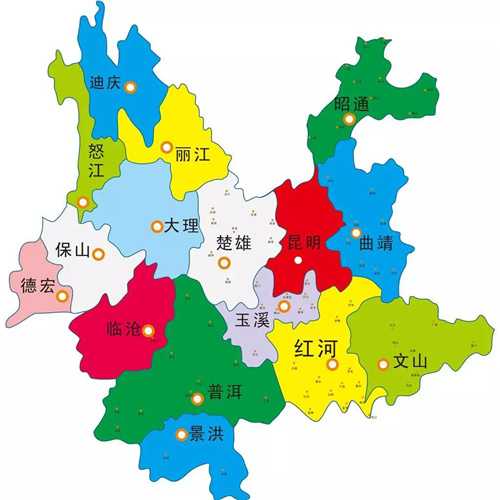
Pu 'er Tea
Although Pu'er City is famous for its tea, Pu'er coffee has a history of a hundred years. It began to be cultivated at the end of the 19th century and developed into industrialization in 1988. Its coffee planting area has reached 789000 mu, the output of coffee beans is 58600 tons and the total output value is 2.469 billion yuan. It has become the largest coffee planting base in Yunnan. Its climate, geography and soil conditions are unique for growing coffee. Pu'er is the main coffee producing area and coffee trade distribution center with the largest planting area, the highest yield and the best quality in China. At present, the planting area of Pu'er coffee has reached 680000 mu, with an output of 54000 tons and a comprehensive output value of 3.9 billion yuan, benefiting more than 250000 farmers, with a per capita income increase of 3836 yuan. In 2021, Pu'er Coffee was approved for the protection of national geographical indication products.
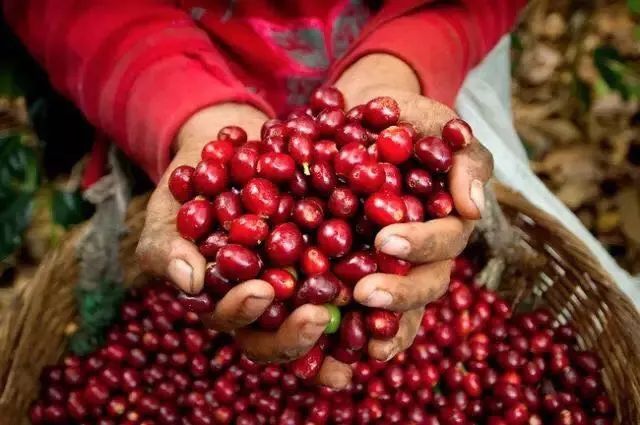
Pu'er Rong is known as the "coffee capital of China". In addition to becoming the main producing area of Chinese coffee, Pu'er coffee is also exported to more than 30 countries and regions, including the Americas, Europe and Asia, creating a new "black gold" market.
Lincang
Lincang City is located in the southwest of Yunnan Province, with the Tropic of Cancer running through the south, Pu'er in the east, Dali in the north, Baoshan in the west, and Myanmar in the southwest. It is a bright pearl in the southwest of the motherland because it is close to the Lancang River. The annual average temperature in Lincang is between 16.8 ℃ and 17.2℃. The dry and wet season is obvious and the sunshine is sufficient. Its climate type is similar to the world-famous high-quality coffee producing areas of Jamaica and Colombia. The rich virgin land not only gives birth to the unique WA culture, but also gives birth to the unique regional flavor of Lincang caffeic acid and glycol. As a result, Lincang won the honor of "demonstration area of Chinese boutique coffee beans" and "core producing area of Chinese boutique coffee". Of the 24000 square kilometers, only 1/3 are below 1300 meters above sea level, which are more suitable for growing high-altitude boutique coffee. The coffee planting area in 2015 is 36000 hectares, which has become the second largest coffee producing area in the country, and will grow to 41700 hectares in 2020. Mainly distributed in Linxiang, Gengma, Cangyuan, Fengqing, Yongde, Yunxian, Zhenkang, Shuangjiang and other counties (cities). Lincang coffee is developing rapidly. now the planting area has exceeded 550000 mu, making it the second largest coffee producing area in Yunnan, and its output has jumped to the second place in the province, accounting for 20%, second only to Pu'er City. It can be said to be a rising star of Yunnan coffee.
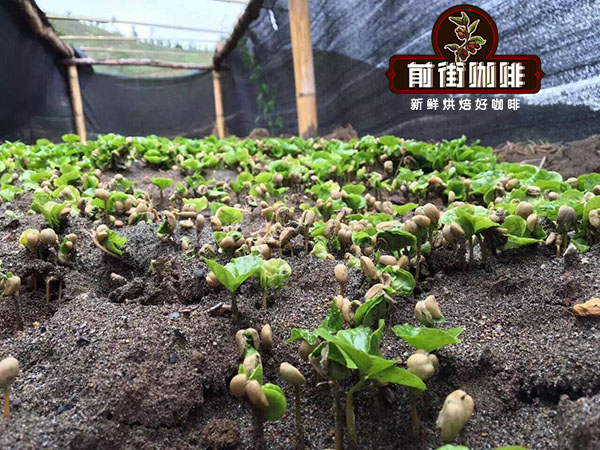
The coffee farm on Qianjie is located in Lincang, near Burma, sparsely populated, and there is only a village of dozens of people nearby. Therefore, it still retains the original environment, which is very suitable for growing good coffee.
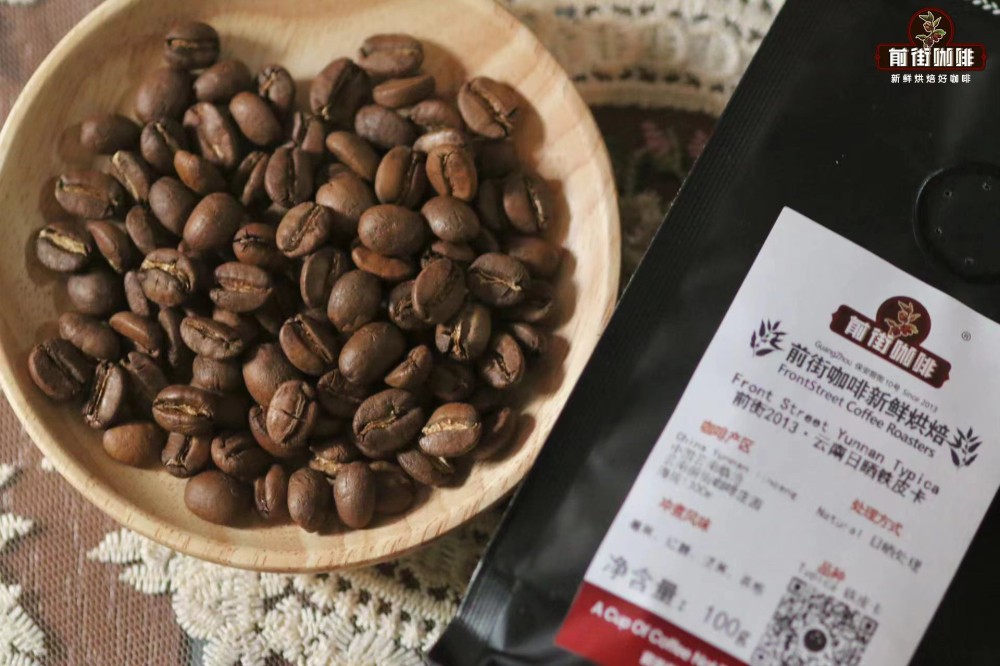
The name of the Yunnan Sunshine Iron pickup truck in Qianjie is "Qianjie 2013". This is the Yunnan bean grown in Qianjie. Qianjie has been growing coffee in Yunnan since 2013. Qianjie originally planted coffee to test a conjecture, that is, "good land, good planting" can really change the criticized taste of Yunnan coffee. Holding this conjecture, Qianjie visited the hot research institute, the old-timers who grow coffee. Found an undeveloped forest and started growing coffee from scratch. Qianjie is well aware of the importance of varieties and specially chose the iron card species that have been rooted in Yunnan for many years. The iron card is more spoiled and must be taken care of, while the Qianjie staff responsible for planting built a simple house at the foot of the mountain and lived a life of sunrise and sunset.
In 2020, Qianjie's first batch of Yunnan iron pickup coffee beans were on the market, named "Qianjie 2013". The all-red fruit sun treatment is used to highlight the sweetness. Qianjie in the cup test when the flavor is preserved apricot, Sanhua plum, caramel chocolate, very sweet.
Baoshan
The average temperature of Baoshan is 21.5℃, and the highest is 40.4℃, which is basically frost-free all the year round. It is recognized as the best producing area of small-grain coffee. The small-grain coffee cultivated here is famous at home and abroad for its strong but not bitter, fragrant but not strong, well-proportioned small noodles, mellow and fruity. The washed Yunnan small grains of coffee in Qianjie comes from Baoshan producing area.
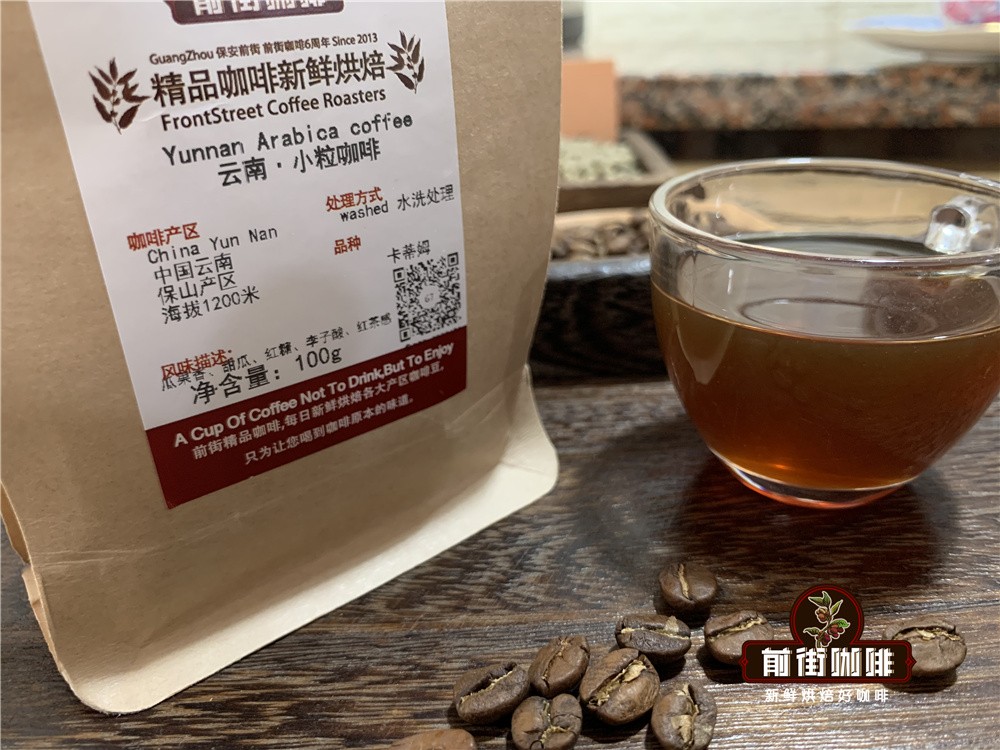
Baoshan small-grain coffee in Yunnan has a long history of cultivation. Baoshan small-grain coffee can be said to be a national geographical indication product, and it is one of the coffee with good quality in the whole country and in the world. Baoshan Coffee became famous very early and was a pioneer in the cultivation and processing of small-grain coffee in China. The first coffee seedling was introduced from Southeast Asia by the late patriotic overseas Chinese Mr. Liang Jinshan. Lujiangba in Baoshan is the earliest area in Yunnan to grow coffee on a large scale and commercially. It has a long history and rich cultivation experience. In 1952, in order to meet the demand of the coffee market in Eastern European countries and the Soviet Union, the scientific and technological personnel of Mangshi Branch of Yunnan Agricultural Experimental Field successfully introduced coffee in Lujiangba, Baoshan, making Lujiangba the first small seed coffee production base and scientific research center in the country. There are still 60-year-old coffee trees in Lujiangba, glowing with vitality.
Dehong-the hometown of Coffee in China
As one of the main coffee producing areas in Yunnan Province, Dehong is one of the earliest coffee growing areas in Yunnan Province. According to historical records, Nongxian Village, Dehong Prefecture has introduced small-grain coffee cultivation since 1914, and coffee cultivation has a history of more than one hundred years. As early as 1963, Dehong small grain coffee was rated as a "rich aroma, slightly sour and delicious" product at the International Expo in Hamburg, Germany, and gained a reputation comparable to that of Blue Mountain Coffee. In addition, Dehong Prefecture also has the largest coffee seed gene bank in China-Ruili Coffee Germplasm Resources Garden of the Ministry of Agriculture, which is one of the first nine tropical crop germplasm nurseries granted by the Ministry of Agriculture.
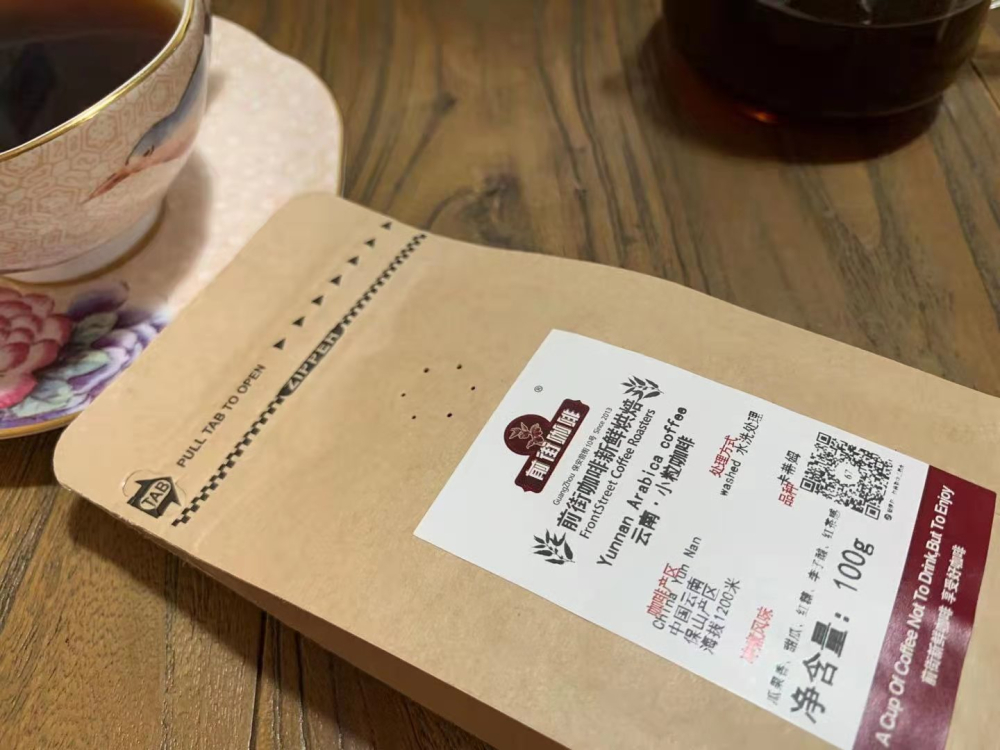
Dehong is also the permanent venue of the Asian Coffee Conference. In the "three-year Action Plan for promoting the High-quality Development of the Coffee Industry" issued by Dehong Prefecture, it is hoped that through three years of efforts, Dehong will be built into a world production base for high-quality coffee beans, the largest instant coffee processing base in China, and a China-ASEAN coffee trade center.
Yunnan coffee bean treatment method
The weather in Yunnan is rainy and foggy, so washing treatment has become the most commonly used method of coffee treatment in Yunnan. Of course, there are also sun treatments, such as Sun Katim Coffee in Qianjie and Iron pickup Coffee in Qianjie on 2013.
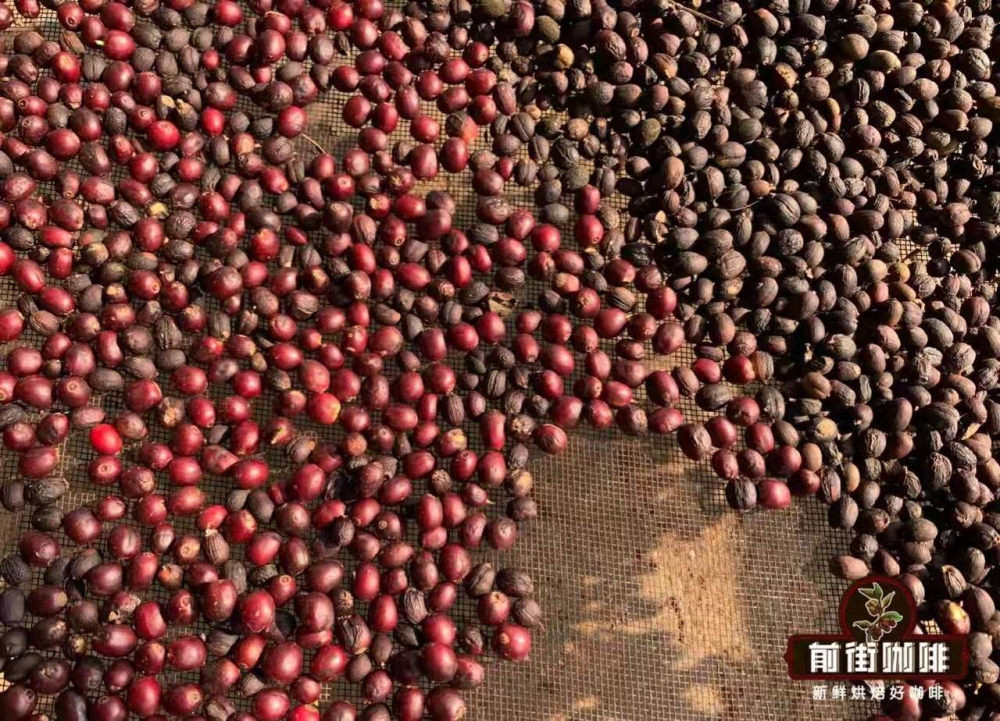
Washing treatment: the harvested berries are peeled to separate most of the pulp from the coffee beans, then the shelled beans are directed to a clean sink, soaked in water and fermented to thoroughly remove the residual pulp layer. Through washing, unripe beans and defective beans are selected because of buoyancy, and the fermentation process is easier to control, so the flavor is not mixed like sun beans, but shows obvious acidity, complexity and cleaner characteristics in the cup.
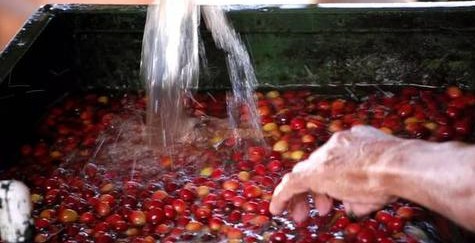
Yunnan coffee bean varieties
The main variety produced in Yunnan is Arabica Arabica, the so-called small seed coffee, commonly known as Yunnan small grain coffee in China. Small coffee refers to Arabica coffee beans, because its coffee beans are small, also known as small fruit coffee, Robusta coffee is called medium fruit coffee, Liberica belongs to large fruit coffee. On the other hand, Yunnan grows Arabica coffee, so it is also called Yunnan small grain coffee, which is also divided into iron pickup and Katim. Although both belong to members of the Arabica family, their flavors are obviously different. Today's Yunnan small grain coffee generally refers to the Katim variety.
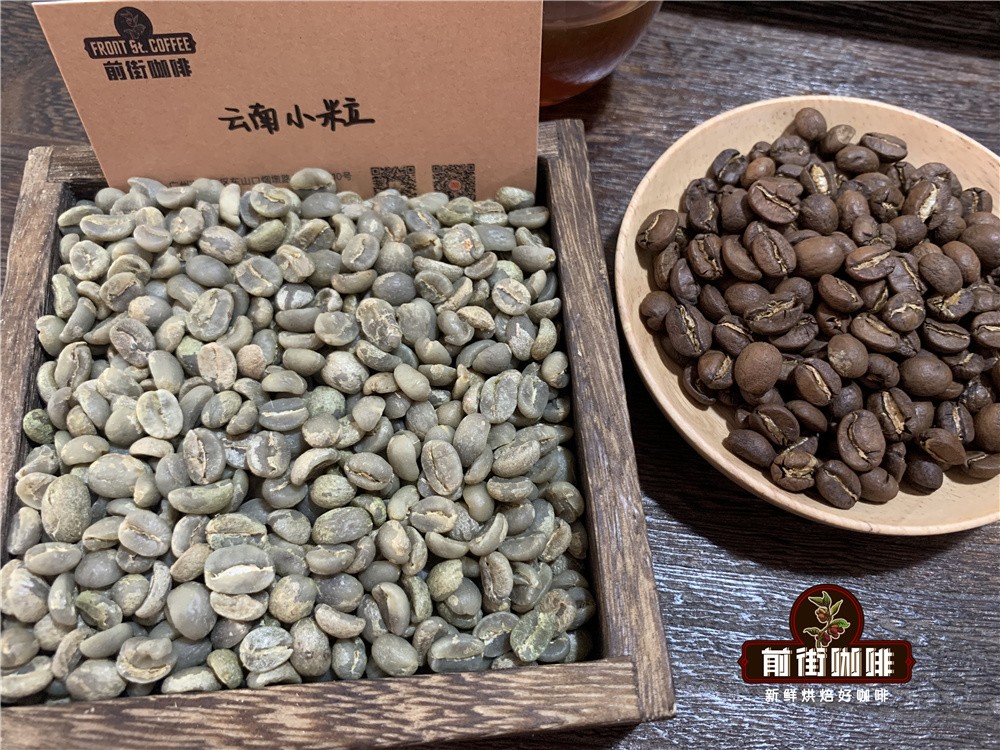
Iron pickup coffee
In 1904, Father Tian planted iron pickup coffee, and in the 1930s, returned overseas Chinese Liang Jinshan also promoted the planting of iron pickup in Yunnan, which was the first wave of coffee cultivation in Yunnan. The second wave was in the 1950s and 1960s after the founding of the people's Republic of China, when coffee beans were supplied to the Soviet Union and extensive tin coffee cultivation began.
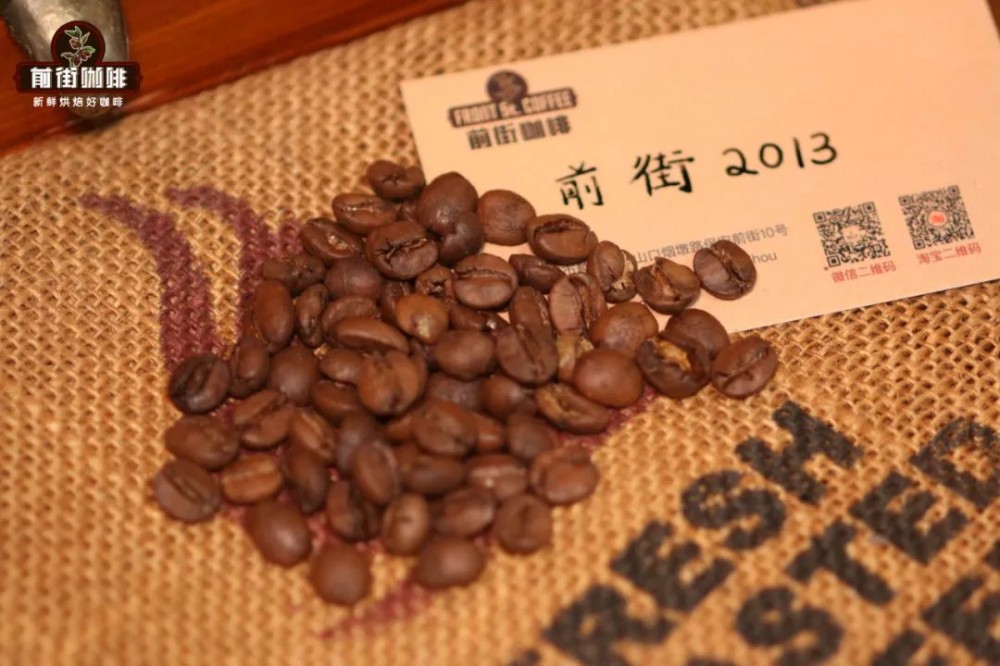
As the iron pickup has poor disease resistance and is vulnerable to leaf rust, it is necessary to observe its growth at any time and place, and take good care of each leaf. Due to the low output of iron pickups, when the planned economy was gradually promoted to a market economy, coffee farmers who lost government guidance lost their enthusiasm and turned to grow other high-value cash crops.
Katim Coffee
In the 1980s and 1980s, Nestl é entered the mainland market and also helped Yunnan coffee growing industry to replenish sufficient coffee raw materials. It is the Katim variety that Nestl é introduced. Katim is a hybrid of Tim and Kaddura, while Tim is a hybrid of Robusta and Arabica. So Katim has the Robusta gene of one big four. This also makes it very tenacious, the yield is also very high, and belongs to the sun-exposed coffee tree (no need for shade forest), the disadvantage is also very obvious, that is, the flavor is not good. Therefore, it is only used as the raw material for Nestl é to produce instant coffee.
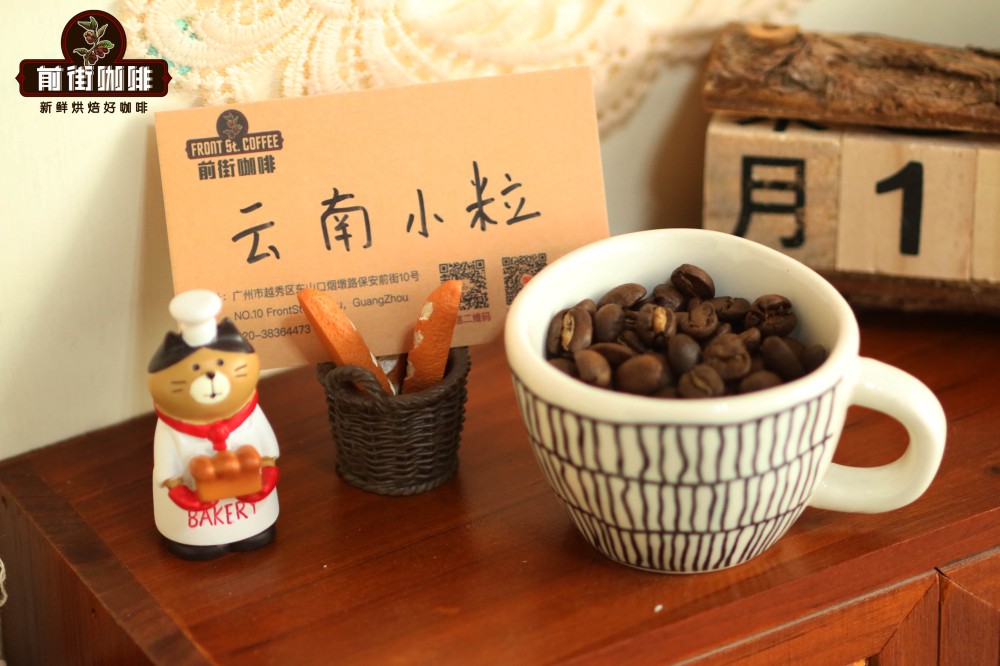
Today, almost 99% of Yunnan's coffee beans are grown by Katim. In terms of flavor, it is a root problem. With the vigorous development of China's boutique coffee market, Yunnan coffee has naturally entered the field of vision of the public. Many friends came to Qianjie to ask, "I drank an anaerobic Yunnan bean, which is very amazing. Has Yunnan bean reached the level of fine coffee now?"
Indeed, in the past two years, Yunnan has begun to study special treatment methods, and we can taste Yunnan beans showing tropical fruit flavors such as jackfruit, passion fruit and mango. It seems that the flavor of Yunnan coffee has to be improved, leaping into the ranks of boutique coffee, of course, the price has also increased several times. But this is like a temporary cure, not a permanent cure, it is difficult to make coffee with a good flavor in Yunnan without starting from the source variety.
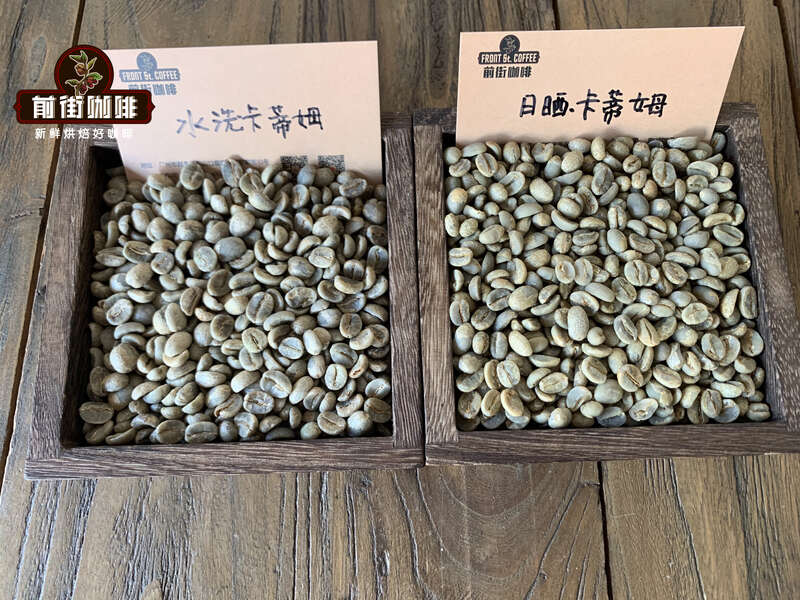
Qianjie believes that the quality of Yunnan coffee has not yet reached the standard of fine coffee. The first is the variety. Katim is mostly planted in Yunnan, which is not as superior as the iron pickup coffee bean in the first place. Secondly, many use anaerobic treatment, although this is a novel treatment, but it masks the original flavor of coffee, and how to talk about fine products.

Yunnan beans in front of the street are traditionally treated with coffee beans such as washing and tanning. On the bean list on the front street, there are three kinds of Yunnan coffee beans, namely, washed small grains of coffee (Katim), sun-treated Katim, and sun-treated iron pickup coffee beans.
Parameters of Yunnan coffee brewed in Qianjie:
In order to retain the sweet and sour and tea characteristics of Yunnan coffee, Qianjie coffee roasted it moderately. V60 filter cup can be used when brewing, powder-water ratio at 1:15, medium grinding (about the size of coarse sugar / 75% screening rate of China 20 standard sieve), water temperature of 88 degrees.
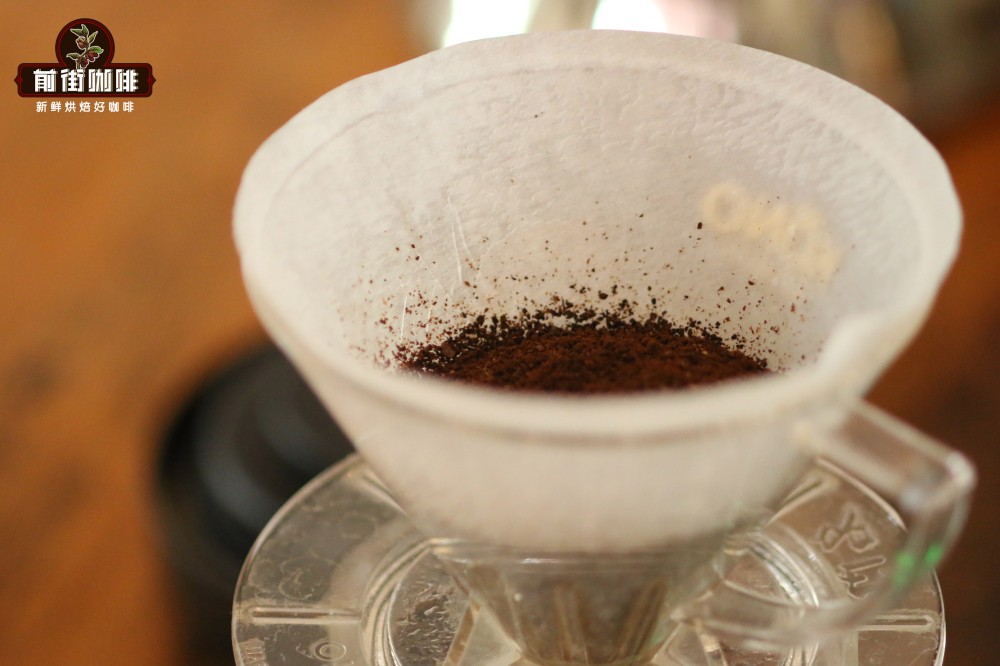
The use of segmented extraction, with twice the amount of coffee powder water for steaming, that is, 30 grams of water for 30 seconds, and the reason for the need for steaming process is to make coffee powder can discharge the internal carbon dioxide gas, so that the latter stage of the extraction is better stable. When the small water is injected around the circle to 125 grams, the injection will be stopped until 225 grams, then the filter cup will be removed after the dripping of the filter cup, and the extraction time will be 2 minutes 39 grams. Next, pick up and shake the whole cup of coffee, then pour it into the cup and taste it.

[Qianjie washed Yunnan small grain coffee flavor] herbs, nutty, chocolate, caramel.
[Qianjie Yunnan Sunshine Katim Coffee] performance: nuts, chocolate, spices, caramel, plums.
Suggestions for making coffee in front of the street:
For the brewing of coffee, Qianjie has always believed that the freshness of coffee beans has a great relationship with the flavor of coffee, so the coffee beans shipped in Qianjie coffee are roasted within 5 days. The purpose of Qianjie roasting is "freshly roasted coffee", so that every guest who places an order is the freshest coffee when he receives it. The bean cultivation period of coffee is about 4-7 days, so when the guest gets it, it is the time when the flavor is the best.
For those who need to be ground, Qianjie warmly reminds you that if the coffee beans are ground in advance, there is no need to raise the beans, because in the process of transportation, the pressure caused by carbon dioxide in the package can also make the coffee flavor round. so you can drink a cup of coffee as soon as you receive the coffee powder. But the coffee powder needs to be brewed in time, because the coffee powder oxidizes more quickly after contact with the air, that is to say, the flavor of the coffee will dissipate more quickly, and the flavor of the coffee is not so good. Therefore, Qianjie suggests buying whole beans, grinding and flushing now, so that we can better taste the flavor of coffee.
Professional coffee knowledge exchange more coffee bean information please follow the coffee workshop (Wechat official account cafe_style)
For more boutique coffee beans, please add private Qianjie coffee on Wechat. WeChat account: qjcoffeex
Important Notice :
前街咖啡 FrontStreet Coffee has moved to new addredd:
FrontStreet Coffee Address: 315,Donghua East Road,GuangZhou
Tel:020 38364473
- Prev
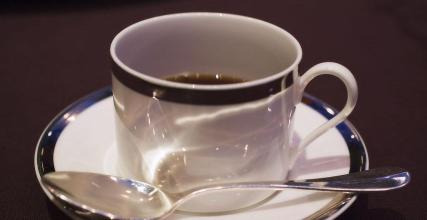
French coffee culture introduces the practice of French coffee
I have heard that France once drank less coffee because of a shortage of coffee, and immediately saw more people taking a nap. It may be an exaggeration, but it is true that the French are addicted to coffee. When the Gulf War broke out in 1991, France was also one of the countries participating in the war. some domestic people worried that the war would affect the supply of daily necessities, so they rushed to supermarkets to buy them. Even the TV station was alarmed when the camera was in front of it.
- Next

Asian coffee with strong flavor The most important coffee producing area in mainland China Yunnan Province
Java's coffee production is not small, but unfortunately most of it is now poor flavor Robusta, high quality Arabica beans are few, this is because a coffee disaster in the 1970s caused coffee farmers to abandon the high quality but delicate Arabica, a large yield, easy to care for but low quality Robusta, only a few government-owned plantations still produce high
Related
- What documents do you need to go through to open a coffee shop? coffee shop coffee shop certificate processing process
- How to purchase Coffee beans in small Cafe how to choose a suitable supplier for domestic Coffee supply Company
- How to drink Starbucks Fragrance White Coffee? how to make Australian White Coffee? what Italian coffee beans are recommended?
- The Story of Flora Coffee: the name of Flora Coffee Bean and the implication of the Flowers on Florna Coffee
- How much does a cup of coffee cost? How much is the profit of a cup of coffee? What is the profit of the coffee shop in a year?
- Yunnan small Coffee, known as "fragrant Coffee", introduces the characteristics of Alpine Arabica Coffee producing areas in Yunnan, China
- 2023 latest Starbucks full menu price list how much is a cup of Starbucks coffee what is better to drink the most popular hot and cold drinks recommended
- Starbucks different kinds of Coffee Price list Starbucks menu 2023 Top Ten Best drinks in Starbucks
- Starbucks Spring praise Comprehensive matching Coffee Bean theme Story Packaging implication and taste description
- The cost of a cup of coffee latte American coffee cost price and selling price

